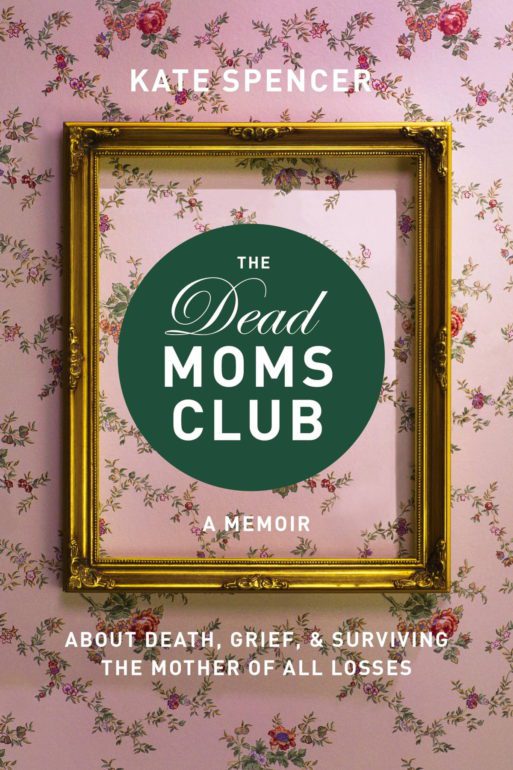 Kate Spencer’s mother, Martha, died from pancreatic cancer when Kate was 27 years old. “The Dead Moms Club” is the 2017 memoir that chronicles Kate’s experience dealing with grief and life following her mother’s death.
Kate Spencer’s mother, Martha, died from pancreatic cancer when Kate was 27 years old. “The Dead Moms Club” is the 2017 memoir that chronicles Kate’s experience dealing with grief and life following her mother’s death.
Spencer is a comedian by trade, so the book is full of wit, sarcasm and comical asides and metaphors. I found myself laughing out loud numerous times. She worked for VH1 at one point, so there are lots of pop culture references peppered throughout.
But at its core “The Dead Moms Club” is about the sorrow and pain of losing your mom, particularly at a young age. Spencer’s target audience is people whose mothers have died; she “welcomes” the new “members” to “one of the crappiest clubs in the world.” And she does not shy away from the fact that her mother’s death is the worst thing that’s ever happened to her.
Some of the more moving aspects of the book relate to the things that Kate wishes her mom was able to experience: Kate’s wedding, the birth of her children, everything that comes with being a grandmother, etc.
Family Ties
It’s evident throughout “The Dead Moms Club” that the Spencer family was a tight-knit group. Kate describes the final day of her mom’s life, when Kate, her dad and brother “slept at her feet like dogs, loyal and desperate for her love and affection until the very end.” They had started hospice in their home two weeks prior.
One major theme Kate addresses in the book is how her mom’s death altered the family structure. Of course, dealing with the holidays without your mom is an obvious change. Traditions just aren’t the same when she’s no longer around. However, Kate also details how the balance of the family unit changed, a more-nuanced occurrence that is less obvious. She writes:
What is it like to be a family unit for so long and then lose the constant thing that connected you, grounded you, made you whole? My family, once on such a clear path, now felt like a group of sailors on a boat returning to port that had suddenly disappeared.
She goes on to describe how the equilibrium of the family scale had been tipped against the three of them, each in a particular way. There were always “two of each” before her mom’s death, and each of them was able to connect as part of a duo: two women, two men, two parents, two kids, two introverts (mom and brother) and two extroverts (dad and Kate).
Now, each of the still-living family members had to face the other two as a “one:” the one woman, the one parent, the one introvert. It’s an interesting way to think about the nature of relationships within a family, and Spencer describes the alteration within her own very poignantly.
Self-Help
 Kate Spencer wrote “The Dead Moms Club” primarily to detail the path her life and grief took following her mom’s death (the book was published 11 years after the fact). However, it also serves as a self-help book for anyone who’s experienced the death of their mother. She offers tips she’s learned along the way, usually served with a hint of sarcasm or self-deprecation.
Kate Spencer wrote “The Dead Moms Club” primarily to detail the path her life and grief took following her mom’s death (the book was published 11 years after the fact). However, it also serves as a self-help book for anyone who’s experienced the death of their mother. She offers tips she’s learned along the way, usually served with a hint of sarcasm or self-deprecation.
Many of the chapters end with lists of suggestions about how to deal with certain occasions that can arise following the death of your mother. A few highlights include: “The Dead Moms Club Mother’s Day Gift Exchange Bonanza To Help You Feel Better On An Otherwise Craptastic Day!” in which she lists ways to connect with other people on Mother’s Day whose moms have died; “Field Guide: How To Tell If An Animal Is Your Dead Mom Or Just A Regular Boring Old Animal;” and “Eight Sassy Dead Mom Comebacks In Handy Listicle Form.”
Clearly, Spencer is adept at using comedy to mitigate (but never truly alleviate) the pain of the death of her mother. This comes in handy throughout the book, as she details a lot of heartbreaking stuff.
Comedic Relief
I don’t think this book would be as readable as it is without Kate Spencer’s humor. During her deeply personal anecdotes conveying intense emotions, she will throw in a funny word or phrase that makes you laugh — a strange phenomenon considering the content. It doesn’t always work, but more often than not her humorous asides and playful metaphors enhance the content.

Author and comedian Kate Spencer.
Credit: bust.com
For instance, she uses mainly “normal” descriptive words to portray the day of her mother’s funeral, describing the weather, the clothes she and her family wore, etc. Her mother was cremated, and so Kate describes the burial:
I always assumed we’d just toss the urn right into the ground, and let the white ashes of her body soak back into the earth. But instead, we buried my mom’s little urn inside of a small, square box that looked like a coffin meant for a Happy Meal.
It’s in this vein that much of “The Dead Moms Club” is delivered. There are certainly difficult, emotionally charged passages to get through. Reading deeply personal accounts about a person’s grief is not the most fun thing to do in your spare time. The comedic relief definitely helps to ease the strain of heavy emotions.
Kate Spencer’s brand of humor may not be appealing to everyone. Sometimes the drollery falls flat and is a bit outlandish. Regardless, “The Dead Moms Club” is an important, very readable memoir navigating the toils of grief and, ultimately, a powerful testament about a daughter’s love for her mother.

 “The Dead Moms Club” by Kate Spencer
“The Dead Moms Club” by Kate Spencer


 John Mulaney’s “Funeral Planning” on Netflix: No Real Plan
John Mulaney’s “Funeral Planning” on Netflix: No Real Plan

 Composting Bodies Is Now Legal in a Dozen States
Composting Bodies Is Now Legal in a Dozen States














